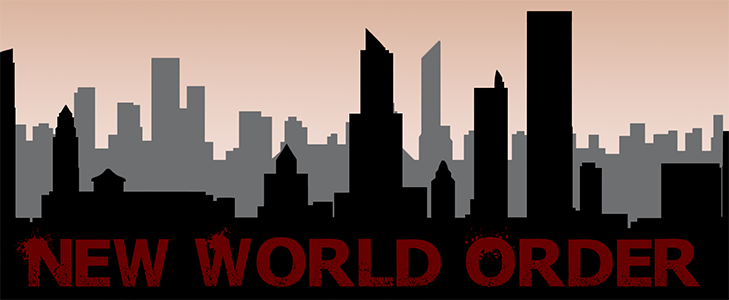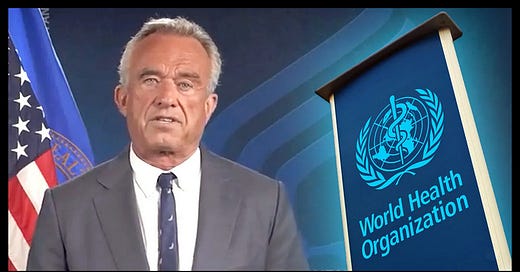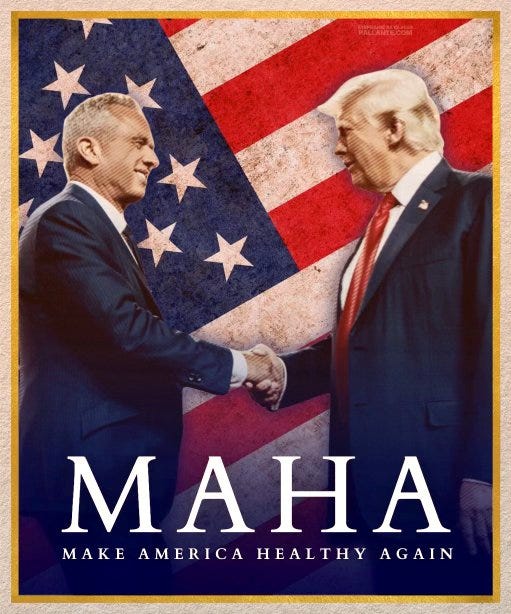🇺🇸 HHS Secretary RFK Jr. Addresses the WHO Via Video as Member States Pass Global Pandemic Agreement
Huge News - Trump Admin Won't Be Playing Their Game...
Source: by Michael Nevradakis, Ph.D at The Defender
U.S. Secretary of Health and Human Services RFK Jr. made a surprise video appearance at the WHO's 78th World Health Assembly today (May 21/25), one day after member states reached a deal on a Pandemic Agreement.
U.S. Secretary of Health and Human Services (HHS) Robert F. Kennedy Jr. defended the Trump administration’s decision to withdraw from the World Health Organization (WHO) and called for a “reboot” of global public health, in video remarks delivered today during the 78th World Health Assembly in Geneva, Switzerland.
👉 🎞️ Watch RFK Jr’s Full Address to the WHO Here
Kennedy said:
“Like many legacy institutions, the WHO has become mired in bureaucratic bloat, entrenched paradigms, conflicts of interest and international power politics. … The WHO often acts like it has forgotten that its members must remain accountable to their own citizens and not to transnational or corporate interests.”
Kennedy’s remarks came one day after the WHO member states reached a deal on a Pandemic Agreement, and months after President Donald Trump issued an executive order withdrawing the U.S. from the WHO on the first day of his second term in January.
Kennedy said the U.S. is open to international cooperation on public health, but not under the umbrella of the WHO.
“Global cooperation on health is still critically important to President Trump and myself, but it isn’t working very well under the WHO as the failures of the COVID era demonstrate,” Kennedy said. He invited the world’s health ministers and the WHO “to take our withdrawal from the organization as a wake-up call.”
Kennedy said the U.S. will continue to focus on infectious disease and pandemic preparedness, but the main focus will shift to chronic disease.
“It’s the chronic disease epidemic that is sickening our people and bankrupting our healthcare system,” Kennedy said. “We’re now pivoting to make our healthcare system more responsive to this reality.”
While the WHO hailed the passage of the Pandemic Agreement as a significant step toward protecting the world from the threat of a future pandemic, Kennedy said the organization’s response to the COVID-19 pandemic was a failure. He said:
“The WHO has not even come to terms with its failures during COVID, let alone made significant reforms. Instead, it has doubled down with the Pandemic Agreement, which will lock in all of the dysfunctions of the WHO pandemic response.
“Well, we’re not going to participate in that. We need to reboot the whole system, as we are doing in the United States.”
During the COVID-19 pandemic, the WHO capitulated to pressure from the Chinese government by promoting “the fiction that COVID originated from bats or pangolins, rather than from Chinese government-sponsored research at a biolab in Wuhan,” Kennedy said, in a reference to the lab-leak theory of COVID-19’s origin.
Last month, the Trump administration launched a new version of the government’s official COVID-19 website, presenting evidence that COVID-19 emerged due to a leak at the Wuhan Institute of Virology. The CIA, FBI, U.S. Department of Energy, U.S. Congress and other intelligence agencies have endorsed this theory.
Trump’s executive order withdrawing the U.S. from the WHO cited the organization’s “mishandling of the COVID-19 pandemic.”
Health freedom activist Dan Astin-Gregory of Free Humanity said the Pandemic Agreement permanently “normalizes and legitimizes the WHO’s dysfunctional approach” to COVID-19.
Pandemic agreement watered down but concerns remain
According to Reuters, while the WHO succeeded in passing the Pandemic Agreement, “the absence of the U.S. cast doubt on the treaty’s effectiveness.”
The agreement, which, when ratified, will be legally binding on WHO member states, was adopted by consensus on Monday at the World Health Assembly. Reuters reported that 124 countries voted for the agreement. Eleven countries, including Israel, Italy, Poland, Russia, Iran and Slovakia, which called for the vote, abstained.
German attorney Beate Sibylle Pfeil said the 11 abstentions are a sign that unity among WHO member states is beginning to “crumble.” She said many states are now being critical of the WHO but “are still not brave enough to raise their voices.”
The Pandemic Agreement, widely referred to as the “Pandemic Treaty,” was first proposed in March 2021. At last year’s World Health Assembly, WHO member states failed to enact the agreement. However, they did pass amendments to the International Health Regulations intended to bolster the global response to future pandemic threats.
WHO member states have until July 19 to reject last year’s amendments before they become binding international law.
The Pandemic Agreement calls for “equitable and timely access to vaccines, therapeutics and diagnostics,” requiring members to provide 20% of their supplies of these products to the WHO during a pandemic, for distribution to poorer countries.
WHO Director-General Tedros Adhanom Ghebreyesus described the agreement as “a victory for public health, science and multilateral action,” and said that the world is “safer today” following its passage.
Despite frequent criticism that the Pandemic Agreement threatens the national sovereignty of WHO member states, the WHO stated that the agreement does not give the organization “any authority to direct, order, alter or otherwise prescribe the national and/or domestic law … or policies of any Party.”
Astin-Gregory called the inclusion of this clause in the agreement a “subtle victory” and “a reflection of the campaigning that has been done around the world.”
Treaty ‘is about locking down until vaccination under emergency rule’
The WHO stated that the Pandemic Agreement also does not give the WHO the ability “to mandate or otherwise impose any requirements … such as ban or accept travellers, impose vaccination mandates or therapeutic or diagnostic measures or implement lockdowns.”
Dr. Meryl Nass, founder of Door to Freedom, said that compared to earlier drafts of the agreement, “all of the orders that WHO wanted to be able to give to member states were wiped out in the final draft.”
But in a post on Substack, epidemiologist Nicolas Hulscher said the new agreement “pressures” national sovereignty, “lays groundwork” for the future implementation of vaccine passports and digital surveillance tools and could facilitate “fast-track approvals” of emergency-use vaccines during pandemics.
“National governments will be pressured to align their laws with global dictates,” Hulscher wrote. “Experimental products would be rapidly deployed without sufficient safety data.”
Physician and activist Dr. Maria Hubmer-Mogg said the WHO’s one-size-fits-all approach to pandemic response “interferes totally” with sovereignty and the doctor-patient relationship.
“The U.S. is very fortunate for having broken from the WHO,” said Jeffrey Tucker, president and founder of the Brownstone Institute. He said the agreement “locks in the model of pandemic response we experienced” during the COVID-19 pandemic, and “is about locking down until vaccination under emergency rule.”
Financing ‘a potential Achilles heel’ for the pandemic agreement
According to Reuters, while passage of the Pandemic Agreement “was touted as a victory” for the WHO, the agreement is significantly weakened following the withdrawal of the U.S. from the organization, which is set to be finalized next year.
“The U.S., which poured billions of dollars into vaccine development during the COVID pandemic, would not be bound by the pact. And WHO member states would not face penalties if they failed to implement it,” Reuters reported”.
Until now, the U.S. was the biggest contributor to the WHO’s budget. Last week, the WHO announced sharp budget cuts and departmental reductions.
Suerie Moon, Ph.D., co-director of the Global Health Centre and an expert on pandemic governance, told Turkey’s Anadolu News Agency that “financing will be a potential Achilles heel” for the agreement.
In his remarks on Fox News, Kennedy said that the U.S. “has provided the lion’s share” of the WHO’s funding historically, but that despite this funding, “other countries such as China have exerted undue influence over its operations in ways that serve their own interests and not particularly the interests of the global public.”
The South China Morning Post reported that the Pandemic Agreement will not enter into force until WHO members finalize an annex for the establishment of a Pathogen Access and Benefit Sharing system — a process that may take up to two years to complete. The agreement will then come into force after 60 countries ratify it.
Independent journalist James Roguski said that the negotiating process for the Pathogen Access and Benefit Sharing system is an “opportunity to comprehend this agreement and expose it for what it is: an attempt to expand the manufacturing capacity, logistics and distribution network for Big Pharma.”
Astin-Gregory said that the U.S. withdrawal from the WHO — and Kennedy’s remarks — indicate that we “might see a parallel organization arriving from the bottom up.” He said a new global public health body “could place some competitive pressure on the WHO or serve as a bargaining tool for real reform at the WHO.”








it is not the people of the member states agreeing to the pandemic treaty, it a a small group of people agreeing to subject the people of the member states to tyranny - NO consent has been given.